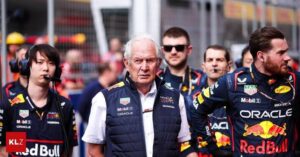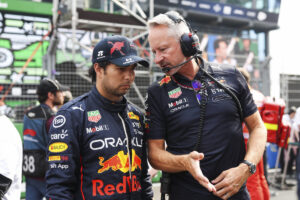BREAKING: Wolff found ‘superpower’ amid mental health… Full story 👇

Wolff found ‘superpower’ amid mental health… Full story 👇
Mercedes team principal Toto Wolff has recently shared insights into his personal battle with mental health, offering a rare glimpse into the challenges that often go unnoticed behind his composed public persona in Formula 1.
Wolff, known for his calm and collected demeanor, especially in high-stress situations, has become a figure synonymous with Mercedes’ dominance in the sport. However, in a candid interview with Sky Sports F1’s Martin Brundle, Wolff revealed that beneath his seemingly unshakeable exterior lies a history of mental health struggles that have profoundly impacted his life and career.
The Mercedes boss admitted that despite projecting confidence and stability, he has experienced significant mental turmoil over the years. He described long periods during which he struggled to think clearly, battling with his thoughts and emotions. Yet, in the midst of these challenges, Wolff discovered what he refers to as a “superpower” – an ability to turn his mental health struggles into a source of strength.
“I have struggled so badly with these things [mental health issues], for months not being able to have a clear thought but I came to the realization that it comes with a lot of advantages,” Wolff explained. “I call it a superpower. This is what I want to give people that have mental health issues as a hope.”
Wolff’s journey to the top of Formula 1 is one marked by resilience and determination. Before entering the world of motorsport, he achieved considerable success in business, eventually transitioning into Formula 1 first as a shareholder and director of Williams, and later as a key architect of Mercedes’ unprecedented success in the sport. However, even as he led Mercedes to multiple championship victories, Wolff grappled with his personal demons, often feeling overwhelmed by the pressures of his role.
Reflecting on a significant moment in his earlier life, Wolff recounted his experience attending a Monaco Grand Prix as a guest in his late 20s. At the time, he had just sold a successful business and moved to Monaco, where he found himself surrounded by the wealthy and successful elite at a glamorous party during the Grand Prix weekend. Observing the scene, Wolff mistakenly assumed that these people, who appeared to lead effortless lives, were immune to the struggles he was facing.
“There was a party and I was there as a guest of someone and I saw these very successful people having a party and I thought, ‘they don’t suffer, in a way I do, that’s why they are successful’,” Wolff recalled. “Twenty years later, I’ve broken those records and I would never have imagined that.”
Despite the external success that came later, Wolff’s internal battle continued. However, instead of allowing his struggles to defeat him, he found a way to harness them, turning what he once saw as a weakness into a unique advantage. Wolff believes that his sensitivity, born out of his struggles, has become a critical asset in his role as a leader.
“What I want to say is with that superpower, when you struggle, you are a sensitive person, and that can be negative or very positive,” Wolff said. “Some of the strengths come from reading the room, understanding a person and seeing through a person, calling bullshit when it needs to be called. I generally have a feeling for what people need in order to perform.”
Wolff’s ability to connect with people on a deeper level, to sense what they need to succeed, and to navigate complex interpersonal dynamics has been integral to his leadership at Mercedes. His understanding of human nature, combined with his strategic acumen, has played a significant role in guiding Mercedes through the highs and lows of competitive racing.
Wolff’s openness about his mental health struggles marks a significant departure from the traditional image of a Formula 1 team principal. In a sport often characterized by its intense competitiveness and relentless pursuit of perfection, vulnerability is rarely discussed. Wolff’s decision to speak openly about his experiences is a powerful statement, one that challenges the stigma surrounding mental health in high-pressure environments.
By sharing his story, Wolff hopes to inspire others who may be facing similar challenges. He emphasizes that struggling with mental health does not make a person weak; in fact, it can be a source of strength. His message is one of hope and empowerment, encouraging those who are struggling to recognize the potential within themselves and to understand that they are not alone.
“That’s why I speak openly about it,” Wolff explained. “That’s why us in F1, laughing at the camera, being so cold, successful, we have struggles. It’s not every day we wake up and say what a great life we have.”
Wolff’s candidness offers a refreshing perspective in a world where success is often equated with invulnerability. His willingness to discuss his mental health struggles not only humanizes him but also serves as a reminder that even the most successful individuals face challenges. By turning his struggles into a superpower, Wolff exemplifies the resilience and strength that can emerge from adversity, offering a beacon of hope to others who may be navigating similar paths.








